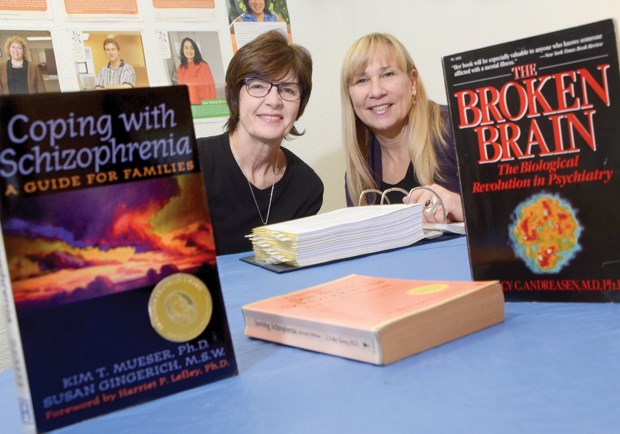A North Shore-based organization is reaching out to friends and family members of people recently diagnosed with a serious mental illness to help them move forward and lead healthy lives, armed with new knowledge and understanding about how to help their loved ones and themselves.
Representatives of the North Shore Schizophrenia Society have been offering the Family-to-Family Education Program since 1999. The intensive 12-session program (the next session of which is launching next week), is free and is designed for friends and family members of people diagnosed with serious mental illnesses - including schizophrenia, bipolar disorder, depression and anxiety disorders.
"This illness does not affect just the individual but it affects the whole family and our medical system does tend to focus on the individual," says Nancy Ford, who came on board as the society's new executive director in November 2013.
While they're beginning to see some positive movement towards the increased involvement of families in a person's treatment and care, families are often left with lots of questions and misunderstandings about how to respond to their loved one's illness.
"If we're not giving the tools to the family, then we're missing a core element of their treatment and support," says Ford.
The Family-to-Family Education Program's curriculum was developed by the National Alliance on Mental Illness in the United States and the North Shore society is an affiliate, overseeing the course in B.C. Providing both practical and emotional support, the course is intended to walk families through a variety of topics including: illness symptoms, biological causes and stages; medications; problem-solving; coping skills; communication; medical system navigation; caregiving and self-support; and managing emotionalresponses.
The program is led by trained volunteers who themselves have someone with mental illness in their lives and who have previously taken the course.
"It's mostly people that found the course so helpful that they want to give back," says Cheryl Zipper, speaking from personal experience. Zipper took the course in 2008 following a family member's diagnosis with a mental illness and found it so helpful she decided to come on board with the society. She currently serves as board president, and teaches the Family-to-Family Education Program at times, in addition to conducting teacher training.
"It's interesting because every time you teach the course it seems you learn more," she says.
The course proves to be a bonding experience for participants, providing them with a sense of community and support going forward.
"There's a lot of sharing that goes on and they find that they can talk to other people who are in the same kind of struggle as they are," says Zipper. "It can get quite emotional."
The society offers the course twice a year on the North Shore (starting in January and September), and once a year in Squamish (beginning in February).
The next North Shore session is running from Jan. 21 to April 8 and will be held Tuesday evenings, from 7 to 9:30 p.m. at the North Shore Schizophrenia Society's Family Support Centre located at 205-1865 Marine Dr. in West Vancouver.
The Family-to-Family Education Program is a major component of the work of the society, which helps those affected by all serious illnesses, not just schizophrenia.
"Most of what we do is support, support for the families, for the person with a serious mental illness. This is one of the major ways that we try and support families and educate them about the illnesses and how to deal with it and how to get through the struggle that they're in," says Zipper.
In addition to the course, society services include: one-to-one family peer counselling and crisis support; a monthly support group; a public education lecture series; school presentations featuring someone diagnosed with a mental illness and a family member who share their personal stories; community awareness and fundraising events; as well as advocacy efforts.
Zipper hopes community members who could benefit decide to register for the upcoming program.
"It would empower them to move on in this journey with their loved one," she says.
To register or for more information on the Familyto-Family Education Program and the other work of the society, phone 604-926-0856 or visit northshoreschizophrenia.org.



